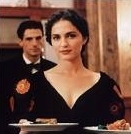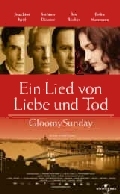Strange as it may sound, Rolf Schübel's
Ein Lied von Liebe und Tod (Gloomy Sunday, 1999) uses the portrayal of a ménage a trois to provide an insight into the politics of the Third Reich.
The film is set in 1930s Budapest where Lasló Szabó (Joachim Król) runs a very upmarket restaurant with his beautiful girlfriend Ilona Várnai (Erika Marozsán). Ilona uses her charms and beauty to entrance the guests, amongst them Hans Eberhard Wieck (Ben Becker).
 |
| Perfect threesome |
Growing menace
The fun and romance of the first half of the film gradually gives way to the strident march of the German National Socialists into Austria and Hungary. Lasló, who is Jewish, tries to accommodate the German officers in his restaurant, but it is mostly Ilona's feminine allure that keeps them in check. The restaurant also becomes "cursed" by a haunting melody that András composes for Ilona on her birthday.
 |
| Ilona: Cursed beauty |
Unfortunately no amount of money can save Lasló from his inevitable fate under the new regime. Ilona tries to rescue him by using her charms on Hans Eberhard Wieck. Hans has become an influential wheeler-dealer in the German army. Just when it seems that he will help her, he rapes her instead. The story ends fifty years later in Lasló's restaurant, where Lasló and András are avenged.
Sensuality and fascism
 |
| Relaxing in a tense time |
Schübel has been making films since 1968, although mostly documentaries. Ein Lied von Liebe und Tod is, as a result, extremely accomplished as both a piece of narrative and an evocation of an era. Schübel's documentarist's eye captures the detail of the period, in the costumes and the witty and sharply observant script.
German film has a variable track record in getting onto the international market. This is one film which certainly deserves to have wider distribution. If it does attract internaitonal attention one can only hope that it does not suffer the fate of other European films, which are eventually bought by Hollywood and have all their poetic beauty replaced by a nice, safe, glossy sheen.
Elke de Wit, 24 April 2000
Pepe Danquart's Heimspiel |
Rosa von Praunheim's Der Einstein des Sex |
Andreas Kleinert's Wege in die Nacht |
Veit Helmer's Tuvalu |
Sebastian Schipper's Absolute Giganten |
Frieder Schlaich's Otomo |
Bernd Eichinger's Der Große Bagarozy |
Thorsten Schmidt's Schnee In Der Neujahrsnacht |
Doris Dörrie's Erleuchtung Garantiert |
Leander Haußmann's Sonnenallee |
Maren-Kea Freese's Zoe |
Click here for the Berlinale website |
Moving on:
- Return to the CER front page
- For more articles on Central and East European film see the Kinoeye Archive



